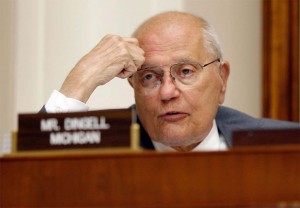
Cong. Dingell shown during his years as head of the powerful House Energy and Commerce Committee that often played a key role in automotive regulation.
He’s been called the “champion of the auto industry,” but also been derided as a roadblock in the push for safer, cleaner and more fuel-efficient vehicles. But one thing is clear, John Dingell spent nearly six decades in Congress as the rock-steady supporter of the U.S. auto industry, with his primary emphasis on the Detroit Big Three.
First taking a seat in Congress in 1955, the now 87-year-old Dingell succeeded his father who had held the safely Democrat district on the south side of Detroit for the 20 years before. Dingell rose to become one of the most powerful members in the House of Representatives – even during those years when the often fractious body was controlled by the GOP.
But he ultimately ran afoul of members of his own party who stripped him of a key committee chairmanship from which Dingell dominated any discussion on issues automotive.
“As a champion of the auto industry, John Dingell had no peer,” said GM spokesman Greg Martin.
Echoed Matt Blunt, President of the American Automotive Policy Council, “Congressman Dingell’s legendary support for the American auto industry in the United States House of Representatives has truly been second to none.”
Over the decades, Dingell helped the industry – Detroit makers in particular – in a variety of ways. That included helping spearhead the bailout that saved both General Motors and Chrysler from bankruptcy in 2009. It was a highly controversial move – despite the fact that a Republican President George W. Bush took the first steps to save the two makers, with his successor, Democrat Barack Obama, completing the process.
(UAW appeals vote at VW plant rejecting union representation. Click Here for the story.)
For much of his time on Capitol Hill, Dingell anchored himself in the House Energy and Commerce Committee, which he long chaired. It was a powerful position that allowed him to forge, or at least have a finger in, some of the most significant legislation affecting the auto industry – especially in the wake of the 1970s twin oil shocks falling which Washington began to take an ever more omnipresent role in the operations of the auto industry.
Echoing the general position of the Detroit Three, Dingell was often at the forefront of the opposition, resisting many emissions, safety and fuel economy regulations – and earning a derisive nickname of “Tailpipe John” from many critics, notes the Detroit Free Press.
The Congressman’s pro-industry attitude was clearly on display during an interview with the Toledo Blade in 1984 when he described his opposition to the use of newly mandated airbags. He described the technology as “defective,” insisting that airbags “would not work…except in head-on collisions.”
The airbag debate was one that Dingell lost, in the end. But he often delayed, or blocked entirely, new mandates. And, as his Congressional career extended into its fifth decade, that began to cut into his power base.
Ironically, it was his own party that took the biggest step to neuter Dingell. He found himself in sharp opposition to Nancy Pelosi as she took on the role of Speaker of the House following Obama’s election. The California-based Congresswoman was a fierce advocate for many of the things John Dingell had long battled against, including increases in the Corporate Average Fuel Economy standards.
Dingell lost that battle – and his chairmanship to a Pelosi ally.
(Federal regulators demand safer child seats. Click Here for more.)
Curiously, Dingell wasn’t always derided as an opponent of environmental issues. Quite the contrary. He was a major factor in passing broader clean air rules over the year.
And he has been outspoken in his efforts to achieve some sort of balance in the latest Congress despite its near inability to pass many new laws of a bipartisan nature. As he wrapped up his career, Dingell continued to sound that note, declaring, “Congress means coming together, the great coming together of the American people.”
“Compromise,” he insisted, “is an honorable word.”
John Dingell will go into the record books as the longest-serving member ever in the House of Representatives. Indeed, some observers were taken by surprise when he announced he would retire even now. Several factors seem to be behind the Congressman’s decision, including the gridlock in Washington, but clearly his age and health have come to be a factor. He has used a cane for many years and now more often is wheelchair bound.
When Dingell leaves the Capitol at the end of the year he will leave behind a strong, if complex and sometimes controversial legacy. But he will clearly have left behind a mark like few others. The auto industry may suffer at the loss of its champion.
